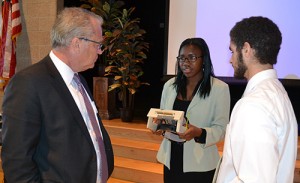
NEWARK – With Ebola making headlines worldwide, it’s no surprise that officials at Atlantic General Hospital are thinking about decontamination procedures.
What’s unusual, however, is that they enlisted the help of local high school students.
Atlantic General Hospital tasked seniors at Worcester Technical High School with figuring out how they could offer telemedicine — the remote diagnosis and treatment of patients using technology — to patients dealing with diseases like Ebola without contaminating their equipment.
Michael Franklin, president and CEO of Atlantic General, said he wanted to know how doctors could help without putting themselves at risk.
“The issue now is people are dying caring for people,” he said.
Students in Worcester Tech’s pre-engineering and biomedical programs were eager to investigate a real-world problem. They had a month to come up with a solution.
“We needed a way to get information from the field to the hospital as soon as possible,” said Meya Chilengi, a pre-engineering student.
Knowing that they needed a device that would provide two-way audio and one-way video with ample battery life, the students researched the options currently available. They couldn’t find anything that fit the bill.
“We thought and we thought and we thought,” student Tripp Ortega said.
They eventually realized the solution was already in their hands — the basic smartphone. The students then developed a lightweight helmet with a groove cut in it for a smartphone such as the iPhone to be mounted.
“We had it at a 60-degree angle so if you’re looking down you’d be able to see everything in front of you,” Chilengi said.
While they were working on the telemedicine angle of the project, their counterparts in Worcester Tech’s biomedicine program developed a prototype of an antiviral suit that could be used in conjunction with the helmet.
Using a surgical gown as the base, they created a one-piece suit that would cover an individual from head to toe. An optional air filtration system would ensure that the person in the suit was breathing clean air.
“Our biggest challenge is we had to put everything together ourselves with not the most ideal materials,” Georgia Parolski said.
In addition to creating the suit, students also studied existing guidelines physicians dealing with contagious diseases are expected to follow to avoid contamination. They came up with a few changes they thought would improve the process, including using disposable aprons and using multiple pairs of gloves.
Michaelann Frate, AGH’s director of infection control, said she was impressed by the students’ input.
“I liked your ideas,” she said.
Another industry professional, Simon King of MedVision, a tele-health company, also praised the students’ work.
“It’s brilliant,” he said. “They came up with a simple solution that does just as effective of a job as Google Glass technology.”
The students said they had enjoyed tackling a real-life problem that is a worry across the world.
“We appreciate the adults respected the opinions of teenagers,
Parolski said.
